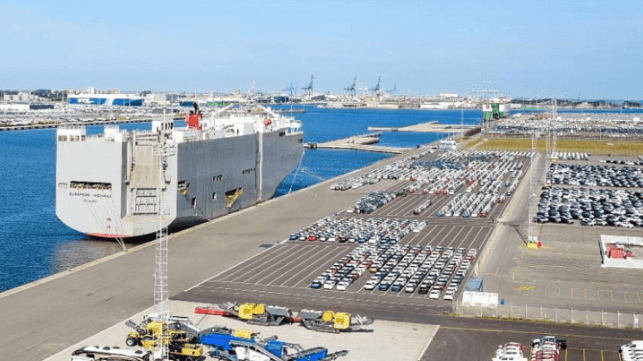Russia-Bound Luxury Cars Stack Up at Port of Zeebrugge

The Port of Zeebrugge - the busiest ro/ro port in the world - has encountered a problem with a small slice of its rolling cargo. Due to sanctions related to the invasion of Ukraine, luxury cars cannot be shipped to customers in Russia, and Zeebrugge's lot is beginning to accumulate thousands of them.
In an ordinary year, Zeebrugge handles thousands of EU-made cars bound for the Russian market, but this is no ordinary year. Since the imposition of the EU's luxury export ban in mid-March, Zeebrugge has received about 8,000 luxury cars for transshipment to Russia, primarily from Asian sources. Even if these vehicles were not built in Europe, they are in Europe now, and so they are stuck in Belgium. There is no indication that they will be moving on to their planned destination anytime soon.
"Customs said they have to be here and they are blocked. We don't know how long they will stay. My guess is that we will be looking for alternative markets," Zeebrugge car terminal director Marc Adriansens told Euronews.
The luxury-car ban is largely symbolic, and has limited impact on overall sales. European car manufacturers are affected most directly, but even they will probably not feel the pinch, according to Bloomberg. The Russian car market is relatively modest: Before the invasion, Russia's economy was smaller than that of the U.S. state of Texas, and it is expected to shrink by about 10 percent this year.
"Given a strong order backlog for all the premium brands, I would expect any lost exports to Russia would be redirected to other markets," Bloomberg Intelligence analyst Michael Dean said.
The luxury-car ban is among dozens of sanctions measures imposed on Russian commerce by the EU, UK, U.S., Canada and Japan. These include restrictions on financial transactions with most Russian banks, prohibitions on doing business with some of the largest Russian state-owned enterprises, and a broad range of sectoral sanctions on specific goods and services. Five of the top six ocean carriers have ceased serving Russian ports (except for humanitarian and food shipments), and Russian shipping is having an increasingly hard time getting parts, insurance and port access.
So far, Europe has held off on sanctioning Russian oil and gas, which play a major role in financing the Russian government and Russia's military operations. Last year, the Russian state raked in revenues of $120 billion from its energy exports - an amount nearly twice its annual military budget.

that matters most
Get the latest maritime news delivered to your inbox daily.
Since EU sanctions on Russian oil and gas cargoes would have tremendous bite, this could be the next step. However, it would come at great cost to the European economy - particularly in northern Europe, which is heavily dependent upon Russian gas supplies.
"The cars are a problem, but as long as gas keeps moving, I think Zeebrugge will be OK," Adriansens told the Wall Street Journal. "But if those cargoes from Russia stop, the port will be in trouble."
